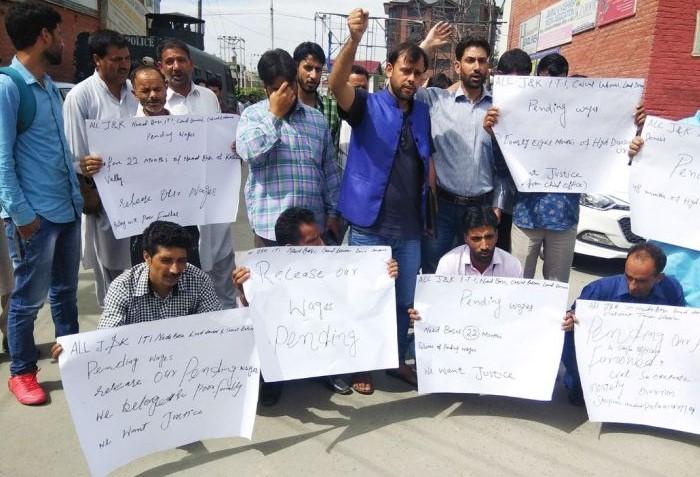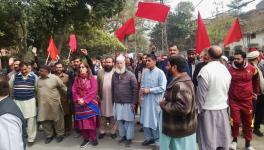PHE Workers Protest, Demand Release of Pending Salaries

Image Courtesy : Kashmir Reader
Daily wagers from Public Health and Engineering Department (PHE) upped their ante against the Jammu and Kashmir government on Monday by organising a mass 72-hour strike in Jammu. They also took out massive protest rallies in support of their pending demands. Under the banner of All Jammu and Kashmir PHE ITI Trained and Contingent Paid Workers Association, irate employees gathered at the divisional headquarters in Jammu and raised slogans. The workers have been demanding the release of their pending salaries and regularisation of the daily wagers and other employees in the state. According to the employees, their salary has been withheld for past 18 months.
In addition to the mass agitation by the workers, PHE daily wagers, including CP workers, ITI-trained and need-based workers have suspended their operations at various pumping and other water supply stations. “We have only one thing to ask for. Fulfil our demands. We can’t live like this. We have a family to run, we are unable to make our ends meet,” said a daily wage worker. The workers have also threatened to paralyse the supply if their demands are not met. “All this while we have been given false assurances, nothing substantial is done to help us out of this. The higher authorities are responsible for not resolving the issues of the PHE daily wagers and others,” said a worker named Sajad.
They have also been demanding implementation of SRO-520. SRO-520 is a notification issued by the government to formally initiate the process of regularisation. Jammu & Kashmir Casual and Other Workers – Regular Engagement Rules 2017 outlined in SRO-520 issued by the Finance Department was enacted to benefit nine categories of workers including daily-rated, casual, seasonal, HDF (Hospital Development Fund) and local fund workers, while NYCs, land donors and ad-hoc/contractual appointees have been left out under the J&K Civil Services (Special Provisions) Act, 2010 for want of eligibility criteria. The policy also includes ITI-trained workers engaged by various departments. According to the SRO-520, the workers are categorized as ‘skilled’ and ‘non-skilled’ on the basis of their educational, technical and professional profile, for regularisation, and the remuneration will be commensurate with the length of their engagement.
On regularisation, the workers shall be designated as Government Services Assistants (GSA). Once the workers are regularised, they will be entitled to all the financial and service benefits including annual increment, a pension under NPS, leave and medical reimbursement, periodical hike in remuneration akin to pay commission, maintenance of service records and will be covered under work, conduct and discipline rules, including retirement.
For regularisation, it’s important for the prospective workers to be a state subject of J&K, possessing the minimum educational qualification of 8th standard or above, and on the date of their initial engagement, their age should be within the minimum/maximum age limit as prescribed for the appointments in the government service.
But, as per Tanveer Hussain, the president of All Jammu and Kashmir PHE ITI Trained and CP Workers Association, SRO has not been implemented fully. Hussain believes that there are many “lacunas” in the SRO issued that deprives workers because of its criteria of regularisation. Besides, he maintains that the government has not provided other benefits like DA, medical allowance, HRA, time-bound promotions of daily wagers, as included in the SRO.
The protests were organised in different regions of Jammu including Nowshera, Kalakote and Sunderbani. Besides, the towns of Rajouri and Poonch also witnessed huge protest rallies by the workers.
Get the latest reports & analysis with people's perspective on Protests, movements & deep analytical videos, discussions of the current affairs in your Telegram app. Subscribe to NewsClick's Telegram channel & get Real-Time updates on stories, as they get published on our website.
























